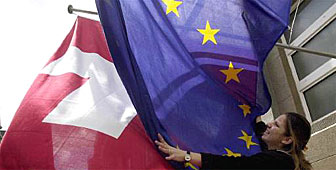Switzerland set to start talks on closer ties with EU

Switzerland and the European Union are set to begin substantive negotiations on a new round of bilateral agreements, governing issues such as cross-border crime.
A Swiss delegation was meeting with EU officials in Brussels on Thursday to finalise the agenda for the next round of talks.
Both the EU and the Swiss government have given the go-ahead for negotiations to begin on four issues, including cross-border crime and fraud, cooperation in the areas of statistics and the environment, and processed agricultural products.
The most controversial is the issue of cross-border crime. The EU wants the Swiss to clamp down on cigarette smuggling, which is treated as a customs offence in Switzerland.
The gulf between the two sides was highlighted by a recent case involving an Italian cigarette smuggler, Gerardo Cuomo, who came to Switzerland to avoid being prosecuted by the Italian authorities.
They eventually secured his extradition from Switzerland, but on a different charge, because the Swiss courts could not extradite him for smuggling.
Switzerland and Brussels are also holding so-called “technical” talks about a number of other potential bilateral agreements.
These include Swiss membership of the EU’s Schengen and Dublin agreements. The former abolishes border controls between its members; the latter is a separate but related treaty focused on a common visa policy, which will be needed once the border controls have abolished.
For its part, the EU wants Switzerland to help it fight tax evasion by EU citizens who have assets in Swiss banks. Swiss banking secrecy laws mean EU citizens can avoid paying taxes on assets in Switzerland – a situation the EU wants to change.
Future negotiations are also likely to include a number of issues left over from a previous round of talks, including services, youth and education, media, and the double taxation of pensions.
The previous talks led to the signing of seven bilateral treaties between Switzerland and the EU, governing issues such as the free movement of people, which will eventually allow Swiss citizens to work in the EU and vice-versa.
These accords, although finalised, still need to be ratified by six of the EU’s member parliaments, including Belgium, which currently holds the Union’s rotating presidency.
Last month, Brussels assured the Swiss foreign minister, Joseph Deiss, that Belgium would ratify the accords by November, and support Swiss efforts to forge new agreements.
Within Switzerland there is growing impatience at the delay in ratifying the accords, which were expected to come into force this year. Switzerland has already implemented its commitments, such as abolishing a weight limit for lorries.
swissinfo with agencies

In compliance with the JTI standards
More: SWI swissinfo.ch certified by the Journalism Trust Initiative
You can find an overview of ongoing debates with our journalists here. Please join us!
If you want to start a conversation about a topic raised in this article or want to report factual errors, email us at english@swissinfo.ch.